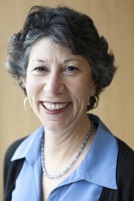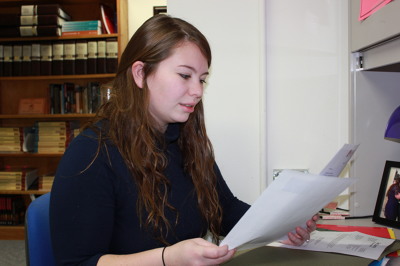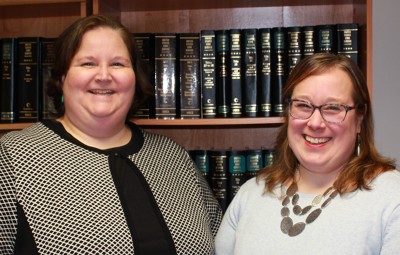EJI Ink Fall 2018 Newsletter
- Director's Welcome
- New Leadership at EJI
- Faculty Awards & Announcements
- Student Articles
Director's Welcome
 By Marsha Mansfield, Distinguished Clinical Professor of Law, Director of the Economic Justice Institute
By Marsha Mansfield, Distinguished Clinical Professor of Law, Director of the Economic Justice Institute
As this newsletter goes to print, our fall semester is more than half over and the students are already starting to think about exams. We are undergoing changes and pursuing new initiatives which you will read about in this newsletter.
First, I want to introduce you to Erin Barbato, the Director of The Immigrant Justice Clinic (IJC). After nationwide search, the Law School’s hiring committee believed that the best candidate was right here at the Law School – and they were right! Erin began her new position in August, but she has worked with the IJC in various capacities since 2013. She supervised students who enrolled in the IJC’s “humanitarian track,” representing victims of domestic violence, human trafficking, and other serious crimes, who were seeking immigration relief. She has also taught Immigration Law at the Law School for the past two years.
Erin has advocated for immigrants since she graduated from law school. She received a “Women in the Law” designation in 2014 and also has been honored with a Justice Award by the Women and Children’s Horizons. Erin began her work as the IJC’s Director by traveling to Dilley, Texas in August with some IJC students, and students from the Law School’s Latino/Latina Law Student Association provided legal services to families held in a residential center. This was a profound experience, about which you may have heard as Erin and one of the IJC’s former students, Daniela Juarez, have been interviewed on Wisconsin Public Radio and by other news sources.
We are so proud of the work that Erin and her students are doing to raise awareness about how the current immigration policies and practices are affecting our community and our country. Please stay tuned to our Facebook page for future events that highlight our faculty and students.
We also are excited to announce the launch of a new clinical opportunity for 2L and 3L students that will be available spring semester, 2019, the VOCA Restraining Order Clinic. The program gets its name from the 1984 Victims of Crime Act, which makes federal funds available for victim support programs. This clinic is the result of a collaboration between the Law School and the Wisconsin Department of Justice, which provided the grant funding for the clinic. The DOJ administers the VOCA award, which is meant to support direct services for victims of violent crime. The new clinic will address a gap in legal services as victims of domestic violence are the least able to secure legal representation in their injunction hearings. Law students, supervised by clinical faculty, will provide representation for victims at their injunction hearings in Dane County, as well as three neighboring counties: Jefferson, Rock and Sauk. You can read more about the clinic here.
The Economic Justice Institute, Inc. is a non-profit, organized to provide financial and other support to the EJI programs. We have a terrific Board and you can “meet” our new Board President, Melissa Williams as she also is profiled in the newsletter. Finally, please read about two superstars who are also graduates of the Neighborhood Law Clinic. Stacia Connell '05 is the managing attorney of the Madison office of Legal Action of Wisconsin and Vicky Selkowe '04 is the Director of Legislative, Rulemaking, and Training Compliance. They discuss their current roles at Legal Action and how their clinical experiences helped form their professional identities and develop their lawyering skills.
We are proud of EJI’s work and the caliber of students that participate in our clinics. Please take a moment to read their stories and thank you for your support.
New Leadership at EJI
EJI, Inc. is fortunate to have a dedicated and involved Board of Directors. Recently, the Board experienced a change of leadership as Melissa Williams took over as Board President. Melissa is a 2007 graduate of the UW Law School. She serves as Associate General Counsel for CUNA Mutual Group in Madison. As such, she engages in a wide-range of legal activities, including counseling business leaders and employees on a variety of legal issues, supervising internal employee investigations with human resource professionals nationally and internationally, and training employees of a 3,000+ person company. She also assists with corporate policy development and implementation. She also supervises an extensive national and international litigation case load, including employment and labor matters, life, and health insurance cases. In short, she is a very accomplished employment attorney. Melissa also has taught a Negotiation and Mediation class for second and third-year law students as an adjunct at the UW Law School.

Melissa’s accomplishments pre-date her work at CUNA Mutual Group. When in law school, Melissa was Note & Comment Editor of the Wisconsin Law Review, and her article, Postadolescent Brain Development: A Disconnect between Neuroscience, Emerging Adults, and the Corrections System, was published in the 2007 edition of the Law Review. She also participated on an international moot arbitration team. Most importantly, she was a member of the Consumer Law Clinic!
Melissa was named a Rising Star in Commercial Litigation by Wisconsin Super Lawyers magazine, and was a CUNA Mutual Group Values in Practice Award Nominee for exemplifying corporate values. When she is not busy working or spending time with her family, you can find her volunteering for Pet Partners, participating in a triathlon, practicing Pilates, or playing volleyball. Melissa looks forward to leading EJI, Inc. and working with EJI Inc.’s other talented board members to support EJI’s programming and initiatives.
Faculty Awards & Announcements
Marsha Mansfield wins Eisenberg Award for outstanding commitment to pro bono service
Professor Marsha Mansfield has won the 2018 Howard B. Eisenberg Lifetime Achievement Award, presented by the Wisconsin Equal Justice Fund. The award recognizes Wisconsin attorneys who have dedicated their careers to the development and delivery of civil legal services to the poor.
Mansfield has championed equal access to justice throughout her legal career—from private practice, where she built a reputation representing consumers and family court litigants, to the University of Wisconsin Law School, where since 2007, she has served as director of the Economic Justice Institute.
As head of EJI, Mansfield oversees four legal clinics dedicated to serving low-income and other underrepresented clients in areas such as housing, employment, family, immigration and consumer law. EJI will launch a fifth clinic in January, the VOCA Restraining Order Clinic, to offer legal services to domestic violence victims seeking injunctions against their abusers.
Additionally, Mansfield serves as a full-time clinical professor in the Law School’s Family Court Clinic, a program available to low-income individuals who need help with paternity, restraining order, divorce and post-divorce matters. Under Mansfield’s guidance, students in the clinic build their lawyering skills at the same time they learn about critical gaps in the justice system.
Mansfield also spearheaded efforts to create the Law School’s Pro Bono Program, which provides students with opportunities to work with local attorneys to deliver legal services to community members in need of them.
The Eisenberg award was established in memory of the late Marquette University Law School Dean Howard Eisenberg and his extraordinary commitment to pro bono legal services. Mansfield was formally honored at a dinner scheduled on Nov. 10, in Milwaukee.
Dream Up Wisconsin selects EJI/Legal Action of Wisconsin proposal for boosting the middle class in Dane County
The Economic Justice Institute is partnering with Legal Action of Wisconsin and others in our community to apply for a “Dream Up” grant. This grant initiative seeks to bring together Dane County’s business, government, and non-profits as partners with the University of Wisconsin–Madison to meet the challenge of increasing the income of 10,000 Dane County residents by 10%. Our project, Removing Workers' Legal Barriers to Employment to Increase Economic Stability & Success, will provide legal services to remove legal barriers to employment, including partnering with service providers and local employers and using data-driven analysis to target and facilitate take-up and program effectiveness. This proposal was one of 11 proposals chosen from 46 submitted to advance to the next stage of review.
Each of the 11 teams whose proposal was selected by the DreamUp Community-University Proposal Review Committee received $10,000 in development funding and additional in-kind resources, such as access to university and community expertise, to develop ideas into full proposals before December. By December 10, three proposals will be chosen as finalists and advanced to the broader Alliance for the American Dream Initiative level. Schmidt Futures has committed to further supporting at least one team from each partnering university in 2019.
For more information on DreamUp Wisconsin, visit https://www.irp.wisc.edu/dreamup/.
Student Articles
A Hard Lesson Learned
By A Current Clinic Student (2L)
I was prepared to make mistakes during my time in the clinic. After all, mistakes are a natural part of the learning process. However, I learned the hard way that some mistakes are less excusable than others. Early in the fall semester, my case partner and I made a significant mistake concerning a client matter. We misread the court docket and left our supervising attorney scrambling for answers. Everything worked out in the end, but my case partner and I were left to consider the consequences of our actions. I took three big things away from this experience, and I am sharing them here so that others can also learn from my mistake. 
First, clinic work continues to be a full-time commitment during the school year. Yes, we cut down to part-time hours; and yes, we have to juggle our classes and other responsibilities. But there is no pause button on the real world. As clinical law students, we are expected to pivot accordingly as our respective cases progress. Clinic work is as real as it gets, and the “school comes first” mentality is no longer a valid excuse.
Second, supervising attorneys are not here to hold our hands or micromanage our work. By selecting us as members of the clinic, our supervising attorneys have entrusted us with major responsibilities to our clients and to one another. They have full faith in us, as do our clients. We cannot operate under the assumption that our supervising attorneys will catch any minor or major mistake that we may make.
Finally, there is little point in dwelling on our mistake once we remedy the situation and learn from the error. After all, mistakes are inevitable. For most of us, this is our first exposure to the practice of law. The work is new to us, and it is hard to catch our own errors when we have little to no experience in the area. That said, it is best to recognize the mistake, take responsibility for it, and move on.
Clients Separated at the Border Helped by the IJC
By Sam Morris (2L)
The Immigrant Justice Clinic (IJC) recently began working on a new asylum case for a client from Central America. Last summer, she was detained at the border and was separated from her young child for over 40 days. During that time, she was only allowed to speak with her child on just one occasion. In response to her efforts to contact her child, the Immigration and Customs Enforcement (ICE) repeatedly told her that they did not know where her child was. Yale Law School and the Muslim Advocates referred this new client to IJC once they learned she was relocating to Wisconsin, and the clinic has been working with her since. 
Unfortunately, the border separation policy that was in the news over the summer significantly impacted this client. During the separation, the child was placed in a government-run “tender-care” facility for children under the age of three. Because of the lengthy separation from her child, the mother and child both suffered severe emotional trauma. The trauma affected the client's ability to articulate her story at her Credible Fear Interview (CFI) when she met with an Asylum Officer. It was difficult for the client to respond to the questions asked in the interview because she was so worried about her daughter.
A positive CFI is a prerequisite to applying for asylum, and thus a failed CFI generally means that an asylum applicant will be returned to his or her country of origin. However, a recent settlement agreement between the government and the separated families will allow our client, now that she and her daughter are safely together, to have another CFI interview. In the case of Ms. L v. ICE, the American Civil Liberties Union (ACLU) recently negotiated a settlement with the federal government, granting parents and children affected by the border separation policy a chance to essentially re-start the CFI process. This settlement allows parents who failed their CFI to have another CFI with the United States Citizenship and Immigration Service (USCIS). Under the terms of the settlement, USCIS will conduct a good faith review of the previous CFI findings, conduct interviews with each parent, allow counsel to be present, and allow new evidence to be submitted.
I will be working with my colleague, Perla Rubio, to represent our client and her daughter in this new CFI hearing. As this settlement is brand new (and, in fact, will not be official until November 15), it is hard to know what to expect from these proceedings. However, IJC is proud to represent this mother and daughter to ensure that they are afforded due process and access to justice.
Transformation Through Participation
By Catherine Lodato (2L)
As many 1Ls may have experienced, I had several assignments in my first year that required me to observe court proceedings. When I attended the assigned court proceedings, I would arrive and sit at one of the benches in the back, often scanning the room for my fellow students who were given away by their large backpacks. I would always note how the lawyers, their clients, and anyone else called to testify or participate, would walk past all of us on the benches in the crowd and walk through these swinging wooden doors to the tables for those actually participating—not just observing.
 In mid-June, one of my clients had a trial. So, my supervisor Marsha Mansfield and I arrived and began to settle into the courtroom. Out of habit, I began to sit at one of those benches where I sat as I observed throughout my 1L year. Marsha turned around and invited me to walk through the swinging doors and sit at the table where the attorneys for the parties sit. It was so foreign to me, to imagine actually being a part of it and to feel as though I was physically transitioning from my role as a 1L, a student, an observer to a clinical law student who is there for a legitimate purpose.
In mid-June, one of my clients had a trial. So, my supervisor Marsha Mansfield and I arrived and began to settle into the courtroom. Out of habit, I began to sit at one of those benches where I sat as I observed throughout my 1L year. Marsha turned around and invited me to walk through the swinging doors and sit at the table where the attorneys for the parties sit. It was so foreign to me, to imagine actually being a part of it and to feel as though I was physically transitioning from my role as a 1L, a student, an observer to a clinical law student who is there for a legitimate purpose.
The most rewarding part of my experience with the Family Court Clinic so far has been being able to make that transition and apply what I’ve learned so far in law school. Throughout 1L year, we learn concepts in lectures unsure how they will apply to our actual careers in law. However, in clinic, I have drafted motions, written letters, observed a mediation, called clients and opposing counsel, and so much more than I could have imagined I would have done while still being merely a law student.
NLC Alumni: Where are they now?
By Bella Sobah (2L) and Zeke Mcdonald-Lewis (2L)
Today, Vicky Selkowe and Stacia Conneely are leaders at Wisconsin’s largest non-profit public interest law firm, Legal Action of Wisconsin. How they became leaders might have something to do with the fact that they were both former students in the Neighborhood Law Clinic (NLC).

Vicky Selkowe, who was both a participant and former supervising attorney in the NLC, is now the Legislative and Compliance Director at Legal Action of Wisconsin. Legal Action provides free legal services to low-income people. Vicky’s job includes lobbying the state legislature and local governments regarding issues that matter to the organization’s clients. Additionally, Vicky works on grant writing, internal professional development, training new staff, and makes sure the work Legal Action is doing is in compliance with the funding it receives from the Legal Services Corporation and other funding sources.
In recalling her experience with the Neighborhood Law Clinic, Vicky tells us that some of the most significant aspects were having the freedom to work autonomously but still have the support and mentorship of her supervising attorney to guide her when needed. Further, working with the NLC was an avenue for Vicky to bring justice to low-income people who were having issues with their employment or public benefits. Vicky says that it was “satisfying to see the power of a lawyer to bring justice to people who have been wronged.”
These experiences with NLC helped prepare Vicky to be an incredible attorney and leader in the community. Working with the NLC reinforced Vicky’s interest in doing public interest work. Her experiences interacting closely with clients let her connect those client realities to policymakers and allowed her to identify areas to improve laws and policies so that fewer low-income people fall through the cracks. Her experiences with the NLC ultimately allowed her to see the difference that lawyers and laws can make in the lives of low-income clients.
These sentiments are echoed by another NLC alumna, Stacia Conneely, who was a part of the NLC from 2003 to 2004. Stacia is also currently working for Legal Action of Wisconsin. She is the managing attorney in the Madison office, meaning she supervises the other attorneys and staff and makes sure things are running smoothly, in addition to handling her own caseload. Stacia’s practice focuses on providing legal services to low-income individuals who are facing foreclosure and other consumer law issues.
Stacia tells us that one of her most valued experiences from her time in the NLC was being able to work directly with clients. She enjoyed being able to talk about legal issues with people who didn’t necessarily know the law. She liked acting as a “translator” and listening to people tell her their problems and try to distill them down to the actual legal questions. In addition to the client interaction - Stacia was also able to gain valuable experience preparing for and conducting a trial. She appreciated being able to see a case through from start to finish and, perhaps even more importantly, being able to bring relief to her clients.
Those experiences in the Clinic made Stacia, like Vicky, sure that this type of work was what she wanted to continue doing in the future as an attorney. Her clinic experiences also allowed her to comfortably step into the busy demands of practicing law immediately after she finished school. The NLC experience helped Stacia realize that you will not always know everything, the practice of law requires constant learning and adapting. Stacia believes that her work providing free legal services to those who really need it has shown her that, even if she doesn’t win the trial, people are still extremely thankful to have someone like Stacia or Vicky just listen to them.

